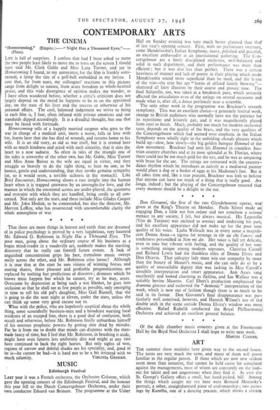CONTEMPORARY ARTS
THE CINEMA (Empire.)—" Night Has a Thousand Eyes."
0 Homecoming." (Plaza).
LIFE is full of surprises. I confess that had I been asked to name the two people least likely to move me to tears on the screen I should have said Mr. Clark Gable and Miss Lana Turner, and yet in Homecoming I found, to my annoyance, for the film is frankly senti- mental, a lump the size of a golf-ball embedded in my larynx. I note that, far from tears, my colleagues' reactions to this picture range from delight to nausea, from acute boredom to whole-hearted praise, and this wide divergence of opinion makes me wonder, as I have often wondered before, whether a critic's criticism does not largely depend on the mood he happens to be in on the appointed day, on the state of his liver and the success or otherwise of his personal affairs. The cool, balanced judgement we strive to bring to each film is, I fear, often infused with private emotions and our standards dipped accordingly. It is a dreadful thought, but one that must be faced with fortitude.
Homecoming tells of a happily married surgeon who goes to the war in charge of a medical unit, meets a nurse, falls in love with her, learns later that she has died of wounds, and returns home to his wife. It is an old story, as old as war itself, but it is treated here with so much kindness and acted with such sincerity, that it stirs the heart to a new sadness. So often in tales of the triangle one of the sides is unworthy of the other two, but Mr. Gable, Miss Turner and Miss Anne Baxter as the wife are equal in virtue, and they struggle so bravely to do the right thing, to hurt no one, to be honest, gentle and understanding, that they invoke genuine sympathy (or, so it would seem, a terrible sickness in the stomach). Like Brief Encounter, Homecoming shows a rare insight into the human heart when it is trapped unawares by an unsought-for love, and the manner in which the emotional scenes are under-played, the quietness and restraint with which they are handled, bring credit to all con- cerned. Not only are the stars, and these include Miss Gladys Cooper and Mr. John Hodiak, to be commended, but also the director, Mr. Mervyn LeRoy, who has resurrected with uncomfortable clarity the whole atmosphere of war.
* * * *
That there are more things in heaven and earth than are dreamed of in police psychology is proved by a very lugubrious, very haunted Mr. Edward G. Robinson in Night Has a Thousand Eyes. The poor man, going about the ordinary course of his business as a bogus mind-reader in a vaudeville act, suddenly makes the startling discovery that he really can foretell future events. A look of anguished concentration grips his face, tremulous music sweeps eerily across the ether, and Mr. Robinson cries havoc! Although it is true that at the start he sees visions of winning horses and soaring shares, these pleasant and profitable prognostications are replaced by nothing but predictions of disasters ; disasters which he knows must happen but which he cannot, try as he may, avert. Overcome by depression at being such a wet blanket, he goes into seclusion so that he shall see as few people as possible, only emerging in time to tell his old pal's daughter, Miss Gail Russell, that she is going to die the next night at eleven, under the stars, unless she can think up some very good excuse not to. What with the police, who are hopelessly sceptical about the whole thing, some scoundrelly business-men and a broadcast warning local residents of an escaped lion, there is a good deal of confusion, both occult and otherwise, before Mr. Robinson finally unburdens himself of his onerous prophetic powers by getting shot dead by mistake. Far be it from me to doubt that minds can dispense with the man- made fancy of time, but I feel that Mr. Robinson, in brushing it aside, might have seen futures less uniformly dire and might at any rate have continued to back the right horses. But only sights of woe, regions of sorrow and doleful shades are his speciality, and, good as he is—he cannot be bad—it is hard not to be a bit irritated with so


































 Previous page
Previous page